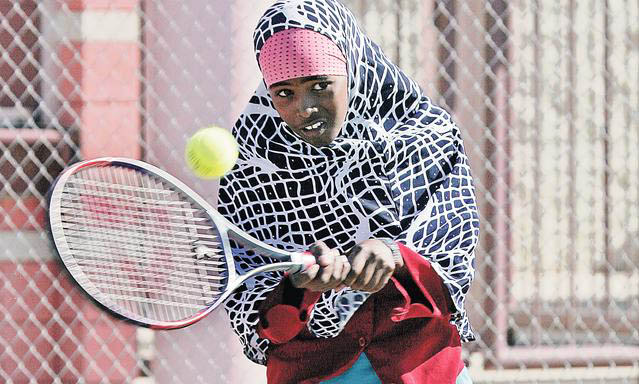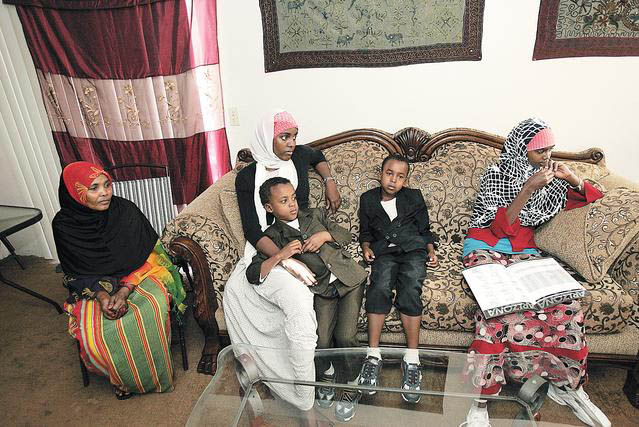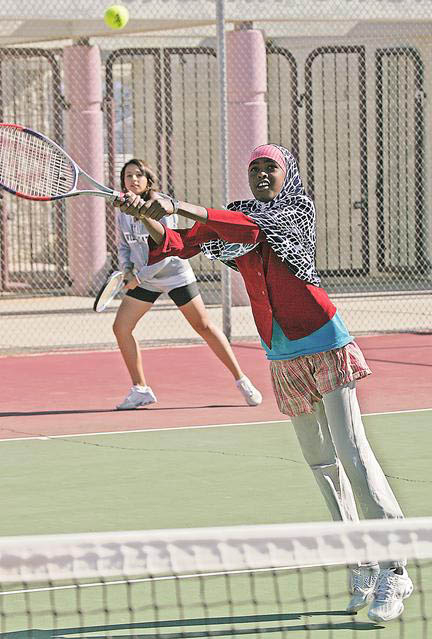

They explode, a starburst white emanating from a cocoa brown backdrop, matched only by a broad, toothy smile that draws you in past her hijab.
When she arrives at Tucson Racquet Club today as one-half of the No. 4 seeded doubles tennis team in the Class 4A Kino region, Buta will look unlike any tennis player there. You could travel the world, to her homeland and back, and still not find someone who meets her exact description on the court.
Still experiencing growing pains after shooting up to 5 feet 4 inches, Buta weighs 86 pounds. Her skinny legs and arms hide underneath sleeves and pant legs, which are then covered by Desert View High School's team shirt and skirt. The Somali maintains the modesty demanded by her Muslim religion.
Because she is so slight, the 14-year-old uses a two-handed grip to hit forehand and backhand. There's a slight arc to her backswing that makes her stroke perfect.
Yet Buta didn't first swing a tennis racket until September — one year after arriving from a refugee camp in Kenya. She considers herself Somali but has never set foot in the war-torn country.
Her talent appeared seemingly out of nowhere; short of a few eighth-grade physical education classes, she hadn't played any sport before. Neither had her parents, whose childhoods as nomads had little time for frivolity.
"It's my life," she said, still smiling, "so I've got to deal with it."
In a case of mistaken identity, Buta's father lost sight in his right eye, replaced now by a milky white orb.
In 1991, the couple — with Buta's older brother, Aden and big sister, Fardosa — left Luuq, a city near the convergence of the Somali, Ethiopian and Kenyan borders. They walked for two days and nights across the border to Mandera, Kenya.
Three years later, the family moved again, this time while Aden was pregnant with Buta. The family settled at the Ifo refugee camp in Dadaab, Kenya. The United Nations established Ifo and two other camps nearby in 1991 after the Somalia government collapsed. Refugees at the three camps number about 150,000 today; 97 percent are Somali nationals, according to the United States Agency for International Development.
"We had no choice (but to move)," Buta's mother said through a translator. "The kids had to grow."
Buta's family lived in a concrete-block home with a tin roof. Her parents sold candy and other sundries, and cooked food with oil distributed by aid groups. The kids went to school, which taught rote English.
In 2007, because of Wako's disability, the family was chosen by the International Organization for Migration to move to the United States.
The family flew to Tucson on Sept. 6, 2007. Buta might as well have been on the moon. "I thought my life was going to be hard," she said. "I thought I wasn't going to come here. I thought I would go to Nairobi."

Buta wanted to go in the ocean — but didn't know how to swim. Crew walked with her into the cold seawater, up to her ankles and then her waist. Later, at Buta's insistence, they rode a wooden roller coaster.
"She's not really scared of anything," Crew said. "She's a really brave, adventuresome person."
That explains swimming lessons that started once she returned to Tucson. And her devotion to academics, arriving at Crew's class at 7 a.m. many days to get extra help. When Buta's family moved near the airport last year after her older brother got a job there, Crew found herself giving Buta rides home. Buta called Crew when she needed help translating or filling out forms; Crew, 37, became more involved with a student's life than ever before.
"It sort of evolved to, 'This is a special kid; I want her to see some of the things that are around,' " Crew said.
Buta needed an after-school activity to become eligible for a free laptop through the Sunnyside Unified School District. She picked tennis; Crew's husband played the sport in high school.
The two picked out a used racket and went to the park. Buta swung and missed almost every ball.
"It was kind of humorous," Crew said. "But I should have known better, knowing her."

"Have you ever heard of John McEnroe?" she said.
Buta had joined Desert View's tennis club, a casual fall gathering of kids. She stayed late at school, pounding a ball against the wall — even in the rain — before taking the bus back to her family apartment. She studied the history of the sport, including the legendary McEnroe.
This spring, she moved up from junior varsity to varsity after only three matches. "I can't believe my first year I'm on varsity," she said. "It's like, so awesome."
Haines didn't touch her swing, and soon learned Buta was hard on herself, and sometimes impatient with others. She demands the play of tennis be proper, and lets some anger bubble below the surface for motivation.
When a girl at school teased Buta about a boy liking her, she took off her shoe and threatened to hit her. Buta laughs about it now.
Buta and her teammates joke with each other every day; they call her "Sandy."
In art class, Buta even designed a superhero for a comic book, also naming her "Sandy." She's like Wonder Woman — but wears more clothing.
"Why women show their bodies here. It's a little weird," she said, blushing.
Earlier this year, Buta woke up at 3 a.m. to do homework after playing tennis the night before. Education is that important.
"School doesn't really come easy for me," she said. "But if you handle it in the right way, it's easy."
She will attend a science camp and a tennis camp this summer, and is looking for a summer job. Her brother Aden's airport job supports the family.
"I just want them to learn something and get a good job, a better job," her father said through a translator. "To go to college."
Buta can't see herself playing collegiately. Her success in tennis is mostly an indication of her mind, Crew said. After all, she came halfway around the world with no experience or knowledge of any sport — and still managed to succeed.
"I think it really has to do with determination," Crew said. "Whatever she's going to do, she's going to be the best at it."
Back to Archives
Back to Main Page